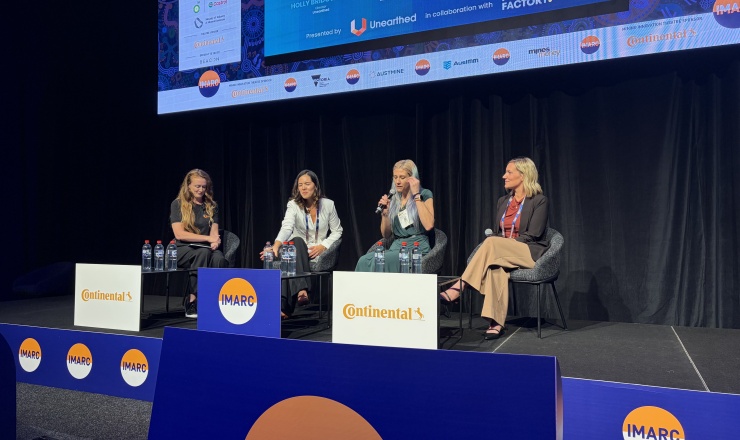
Funding the Future of Mining Tech at IMARC 2025
Hosted by Unearthed in collaboration with Founders Factory , our session “Funding the Future of Mining Tech” brought together a
Read articleThe Ore-X Challenge heralded Unearthed’s first online resource sector challenge. Open to innovators globally, participants were tasked with creating an ore-grade prediction algorithm. Participants had to process images to find features and then estimate the overall grade of each image. Partners Gold Fields provided images and local mining data startup GlassTerra hosted the data.
275 competitors from over 20 countries submitted more than 100 entries in the space of a month – creating algorithms that were more accurate and faster than geologists in classifying the data. Brian Lynch from Queens University in Canada scored first prize and $10,000 to license his prototype to Gold Fields.
We caught up with Brian to find about his experience participating in the challenge.
Q. How did you hear about the competition?
A. I actually heard about it from a colleague of mine, my supervising professor at Queens University. He works in conjunction with another company who is a partner of ours and they’re always on the lookout for what is happening in the mining industry. They found out about the competition first.
Q. Could you describe the approach that you took?
A. I looked at a few types of computer algorithms in the past that could solve these types of problems, namely image processing and computer vision. Clearly from the outset this was a problem that was focused processing images to look for patterns and characteristics. I immediately knew what types of algorithms I wanted to use and started to explore if they could yield the kind of information that Gold Fields was looking for. Once I saw that working, I just kept developing it further.
Q. Do you have a background working in the resource space?
A. Not so much, my background is really in aerospace and space. For the past two years I worked at the mining systems laboratory at Queens University. They have a mining department that was established in 1898 which is very well-established and high ranking. I joined a few years ago because my interest is in space exploration and the development of the moon and Mars. A big part of that involves mining and exploring resources.
Q. Did you encounter any challenges working in the resource space?
A. A lot of mining companies are well established in terms of the procedures that they have used for decades. Those procedures work and produce what the mining companies want. If they make a profit and maintain their margins the way they’ve always done so, it can be difficult to convince these companies to look into new technologies. Of course, once they can see the benefit of the new technologies they are usually quite happy about it.
Q. What is the potential future of your project?
A. I certainly started this project mainly out of interest for solving a problem. I also loved working on this type of challenge where you got real life date available – the fact that the problem wasn’t just put to us as an open ended question asking for proposals but instead actually provided these real photographs and information.
When I started it I wasn’t really thinking about it as something that was a) my primary research topic or b) a startup or some kind of commercial product. Now that I see it working very well and the feedback has been quite good, I may take a look at whether it could be something that would be worth trying to turn into a startup company. At the university where I work at, there is a very good structure for helping researchers do that.
I’ve yet to talk to Shaun Hackett and the Gold Fields team to get an idea of actually how well it does work. It would be interesting to hear how applicable this is and then work out if it is worth discussing with other mining companies or to sell it on its own to a mining consulting company. I’m definitely interested in commercialising it and working on it further.
For me as a researcher, I’m excited to write a paper about this and publish it.
Q. What outcomes do you see from the competition?
A. I certainly got a lot of positive feedback from colleagues at work and a lot of attention – it has been good publicity for our team. I think this is a valuable addition to my resume as it demonstrates my skills in quite a few different areas. It’s been great to have something from a computer vision (which is important to robotics) and mining side of things.
[pullquote type="left"]I really thought that Gold Fields, GlassTerra and Unearthed did a good job of giving people the information they needed[/pullquote]Q. What advice can you give to future participants?
A. You just have to play with the data you’re given. I really thought that Gold Fields, GlassTerra and Unearthed did a good job of giving people the information they needed – and not too much that they got overwhelmed. In the future if people are going to participate in the same thing, just have to look at what you’re given and keep trying and see what happens.